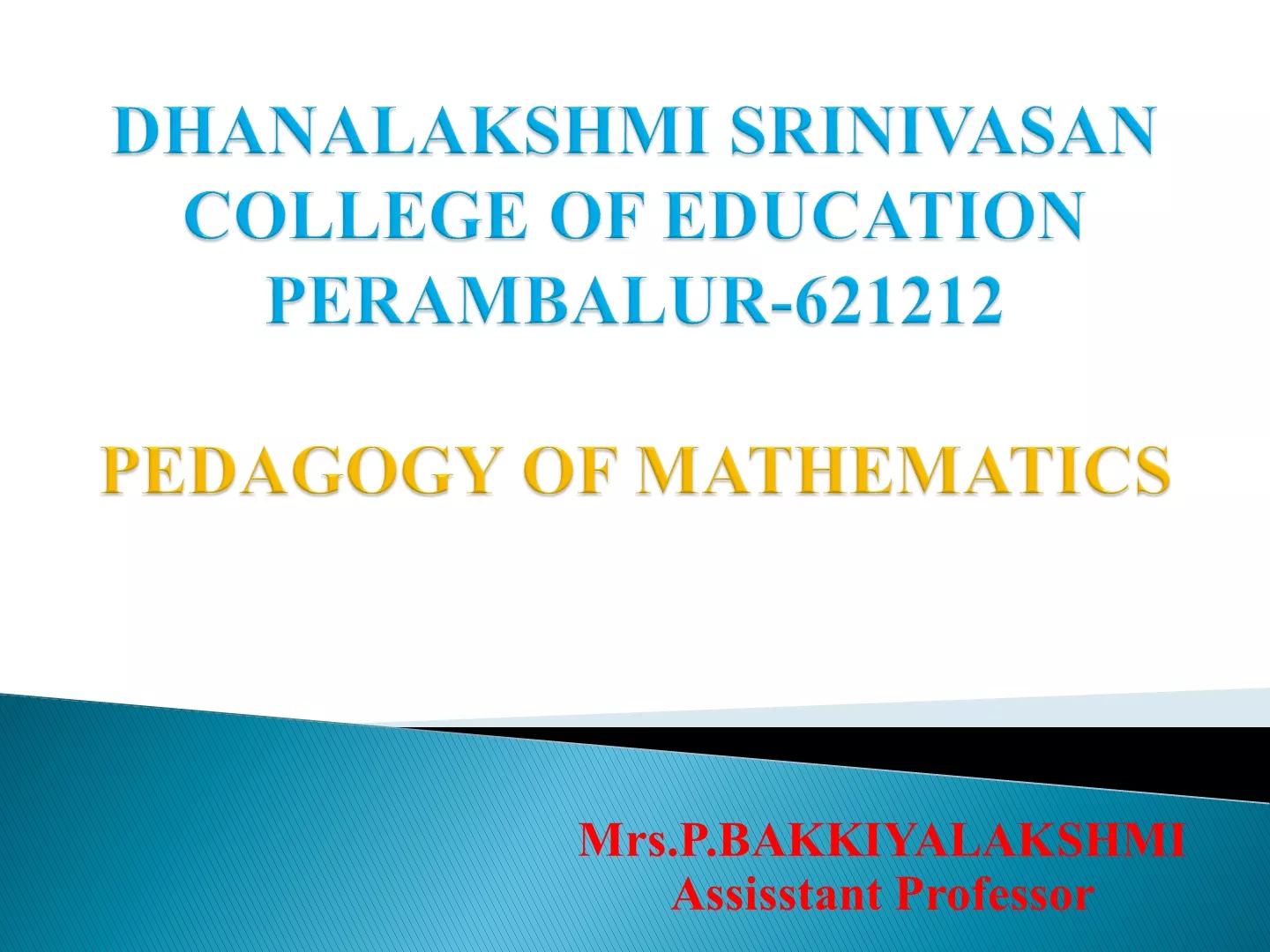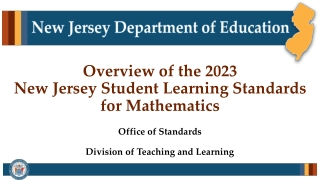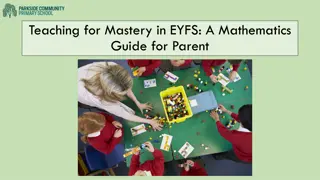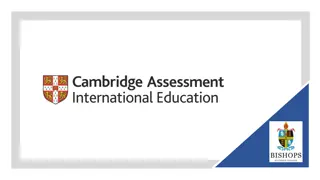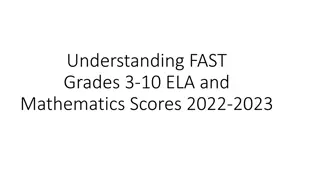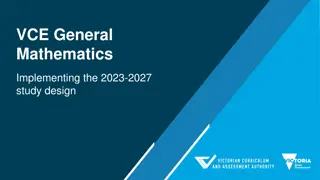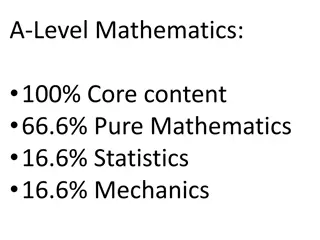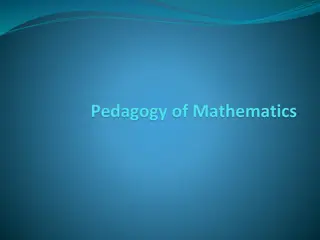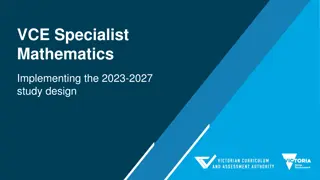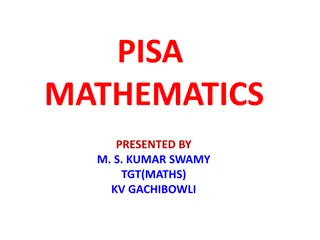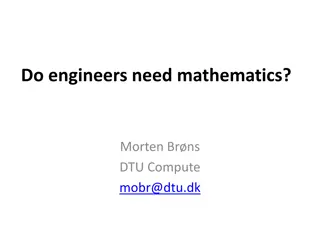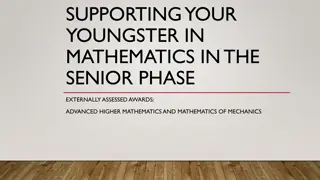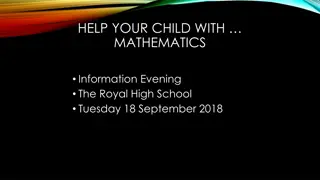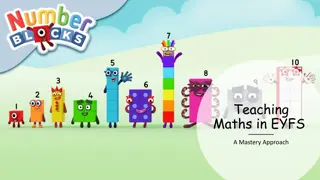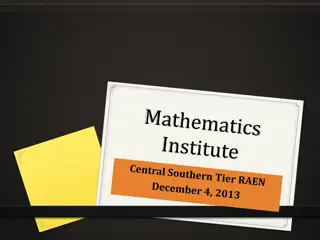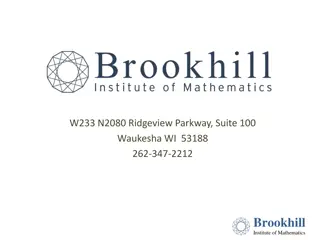Mathematics Mastery at Windhill21: A Journey of Success
Windhill21's Mathematics Mastery program focuses on providing students with ample opportunities to apply their mathematical skills through problem-solving and reasoning activities. Students demonstrate a strong grasp of basic mathematical concepts, enabling them to reason at a high level. The journey, initiated in 2016, continues to evolve with a focus on designing, delivering, reflecting, and refining instructional practices. The culture at Windhill21 emphasizes research-driven practices, drawing insights from Pisa, Singapore, and Shanghai to enhance the effectiveness of mathematics education. The impact assessment shows positive results with students in the program making more progress compared to their peers.
Download Presentation

Please find below an Image/Link to download the presentation.
The content on the website is provided AS IS for your information and personal use only. It may not be sold, licensed, or shared on other websites without obtaining consent from the author.If you encounter any issues during the download, it is possible that the publisher has removed the file from their server.
You are allowed to download the files provided on this website for personal or commercial use, subject to the condition that they are used lawfully. All files are the property of their respective owners.
The content on the website is provided AS IS for your information and personal use only. It may not be sold, licensed, or shared on other websites without obtaining consent from the author.
E N D
Presentation Transcript
Maths Mastery, the Windhill21 Journey
Teachers provide pupils with many opportunities to apply their mathematical skills in problem-solving and reasoning activities. Pupils can articulate their learning clearly, using correct mathematical vocabulary. Pupils basic mathematical skills are very secure, which enables them to reason at a high level.
The journey began in 2016 and we are still travelling ..
DESIGN DELIVER REFLECT REFINE
CULTURE OF WINDHILL21 Research Pilot Reflect Refine Roll out with robust intention, driven by a passionate team Continuous review using the outcomes and feedback from pupils and staff
RESEARCH-DRIVEN Pisa Singapore and Shanghai EEF Researched underlying principles of maths mastery and they made sense
Singapore China United Kingdom
What is the impact? On average, pupils in schools adopting Mathematics Mastery made more progress than similar pupils in schools that did not adopt the programme. The small positive effect can be estimated as equivalent to approximately one month s additional progress. The effect detected was statistically significant, which means that it is likely that that improvement was caused by the programme. The programme had a higher impact on pupils in Year 1, who made approximately two additional month s progress on average, than those in Year 7, who made approximately one additional month s progress on average. It is unclear whether the programme had a different impact on pupils eligible for free school meals or on higher or lower attaining pupils than on higher attaining pupils. In follow-up studies, data from SATs and GCSEs should be used to evaluate the medium and long-term impact of the programme on different groups of pupils
UNDERLYING PRINCIPLES OF MATHS MASTERY they made sense Certain principles and features characterise this approach: Teachers reinforce an expectation that all pupils are capable of achieving high standards in mathematics. The large majority of pupils progress through the curriculum content at the same pace. Differentiation is achieved by emphasising deep knowledge and through individual support and intervention. Teaching is underpinned by methodical curriculum design and supported by carefully crafted lessons and resources to foster deep conceptual and procedural knowledge. Practice and consolidation play a central role. Carefully designed variation within this builds fluency and understanding of underlying mathematical concepts in tandem. Teachers use precise questioning in class to test conceptual and procedural knowledge, and assess pupils regularly to identify those requiring intervention so that all pupils keep up.
RESERVATIONS TO IMPLEMENTING MM Experience of early adopters Ofsted reports Prescriptive Teachers subject knowledge Text books at the time Stretching the more able? Changing lesson design from Mild, Spicy, Hot
Need expertise Good subject knowledge Drive and passion Leadership ability Train up as an expert
What did Windhill21 have? A Maths lead and a Maths team to have the will and to drive across the school
LEAP OF FAITH
Date Action September 2016 3 teachers went on I day Mastery course to understand need/rationale October/November 2016 Teachers and TAs attended manipulatives course December/January 2017 4000 invested in manipulatives January 2017 HFL INSET for all teachers January July 2017 Different year groups tried various ideas to take on board HfL training advice, also some started to use White Rose resources for reasoning and problem-solving activities alongside old scheme / self- generated questions. Internal development meetings based on HfL Take one manipulative series. Autumn 2017 Essentials planning by HfL was made available free of charge for PA Plus subscribers so we downloaded it and years 3 and 4 used it as the basis for their planning. Other year groups continued to base their planning on White Rose, with recognised need to take on board additional opportunities for practising before applying. November 2017 Cohort 3 journey begins for maths lead. THIS WAS A KEY TURNING POINT FOR UNDERSTANDING THE MASTERY PROCESS New lesson design proposed and introduced in years 2, 3, 4 EXPLORE PRACTISE APPLY CHALLENGE. Underpinned by small steps, narrow focus, coherence and variation. Mastery focus in Year 1. November 2017 onwards Rest of Essentials scheme purchased for all year groups but mainly used in Years 3 and 4. Continuing refinement of lesson plans and in-house training on the different aspects of mastery. January 2018 Introduced Maths Meetings (15 mins every afternoon) as a way of practising prior learning topics and key number facts March 2018 Introduced CLIC as a way of structuring daily maths meetings September 2018 HfL INSET training on the rationale for using Essentials planning and how it works. All year groups adopt HfL as the basis for long term planning and WH21 lesson design EXPLORE PRACTISE APPLY - CHALLENGE.
BIG ACTIONS, BIG IMPACT Action 1: Maths Lead (Sarah-Jane Pyne) was a Maths Mastery specialist. KS1 maths lead was upskilled (HFL courses) Action 2: Agreed to all use HFL Essentials planning Action 3: Maths Lead and KS1 lead planned with teachers Action 4: Peer to peer lesson design Action 5: Whole school delivered Maths Meetings
This is not a quick fix it s a journey
KEY FINDINGS o Learning is visible enabling AFL immediate intervention in the lesson o Getting pupils to think o Maths Mastery supports the acquisition of life-long maths skills o Children are more aware of the skills o It takes longer to plan o Gains for marking assessment on the spot no fire-fighting when you have taken books home realising a third of the class did not understand o Gives time to readjust next lesson
OUTCOMES Children positive about maths across the school Books show a clear learning journey within the lesson and across a sequence of learning Data shows a positive impact on borderline pupils although a bit too early to say definitively that data has improved over all 2 year Improved teacher pedagogical knowledge e.g. using models /bar models/manipulatives with older children/ use of prove it. Use of talk for understanding (speaking frames) structures of mathematical thinking Supports Growth Mindset
OBSERVATIONS OF SHANGHAI TEACHERS: higher / lower attainers and the language barriers observed. insufficient time for independent practice so that children can embed new learning or apply it to more challenging areas (which is linked to addressing the differences between rapid graspers and lower attainers). However, from my observations of all the lessons I have seen so far, in Year 4 and Year 2, I think the positive takeaways for adopting are: careful selection of examples/ representations so that the best examples are used to convey a learning point focus on knowing and learning underlying number facts use of multiple representations different ways of looking at the same thing so that children can understand a learning point in different contexts) use of stem sentences to aid understanding and draw attention to the key points giving the children non-standard and deliberately incorrect examples (known as negative examples) to really see if they understand
WHAT NEXT? Reflect on Shanghai teaching and develop key takeaways Discuss the thorny issue of challenge Ensure maths mastery is deeply embedded Evaluate impact Eradicating any residual resistance Early Years Mastery Implementation


